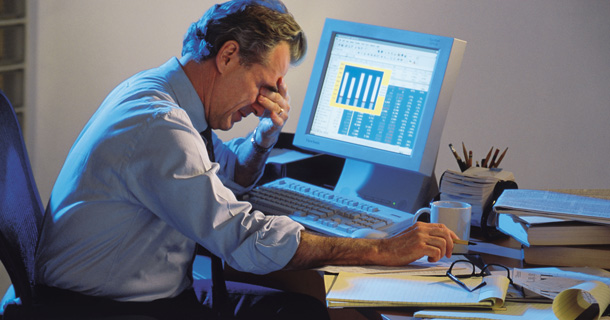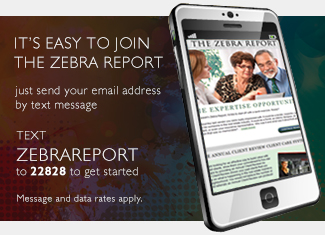
Last week my Zebra Report focused on what I called the “distraction diet” – a concept based on regulating the interruptions you allow which disrupt your ability to focus and work.
Remember, distractions draw us in because they either: 1) add pleasure to our lives, or 2) remove pain from our lives.
The first step in managing your distractions is to determine why you are being distracted. Is the task you are trying to tackle something that:
- Bores you?
- Frustrates you?
- Doesn’t feel natural to you?
- Takes too long?
- You don’t have the tools to complete?
- Feels as though it won’t yield results?
We don’t usually dig deep to discover the why of our distractions. Usually there’s some level of discomfort or disconnect… so we quickly turn aside from our task, and welcome the distraction.
One of the biggest distractions today? The Internet!
Before you all think I’m some sort of technology dinosaur who wants to revert back to prehistoric times, let me tell you that I love the Internet. It’s a great tool, a phenomenal resource, and something that I harness to run my business. I appreciate the benefits it offers … but I don’t spend hours and hours each day online without a purpose. When I’m online, I have a strategy for what I need to accomplish.
Is the Internet one of your distractions? Do you find yourself spending hours playing Angry Birds, or chatting about personal things on Facebook or Twitter? Perhaps you find yourself hanging around the office for hours at a time, socializing? Or do you find yourself on the phone for hours at a time with friends and family? None of these things are bad in and of themselves, but if you find you’re spending your time this way and you’re not reaching your goals it’s probably time to disrupt the pattern of these distractions.
Last week I talked about the need to build a series of small good habits and patterns. These good habits can slowly replace some of the bad habits (your “distractions”), and can become easy-to manage routines that allow you to become more productive.
The Nuts and Bolts of Eliminating Distractions:
I want to talk about strategies that allow you to eliminate (or at least reduce!) the distractions in your life. Some of these are very basic, and simple to implement.
- Create an environment of peace and quiet. You probably didn’t, or don’t, encourage your kids to do homework with the TV on or the stereo blaring. In the same way, you will work best on tasks with some measure of silence. If you don’t have a private office where you can shut out the noise, try wearing headphones (there are some great noise-cancelling ones on the market). There’s no need to have music playing; in fact, you’ll likely get more done if there isn’t. But when they see your headphones, the people around you will quickly get the idea that you value quiet time and shouldn’t be interrupted.
- Prepare for your tasks. If you have planned in advance and have all your materials ready, and a list of what you need to accomplish, you’re less likely to spin your wheels. Make sure you have a task list that details exactly what you need to accomplish during your task session.
- Create a Do-Not-Disturb sign for your desk. Make sure it’s big, visible, and that everyone understands that when the sign is up, they need to respect your time. For this to be effective, you can’t simply leave the sign up all day – that’s like the boy who cried, “wolf!” When your task time is complete, remove your sign.
- Turn off the email. And Twitter, your phone, IM, your Morse code transmitter, and any other method you use to communicate with other people. Set up times to be on IM or Twitter. Determine when each hour, or two, you will check email and phone messages. And then stick to it. As much as we tell ourselves that people need to hear from us immediately, an appropriate voice-mail message on your phone, or auto-responder on your email, will let people know when to expect to hear from you. Even more importantly…
- Unplug from the Internet. I know you’re probably reeling in shock at the thought of working offline, but it’s absolutely critical. Like I said earlier, the Internet is great… but without a doubt it’s one of the biggest distractions out there. If you need to use the Internet for the project you’re working on, try using one of the software programs available that blocks the sites that suck you in, or a program that only allows you to be online for a specified period of time before notifying you that time is up.
- Clean up your desk, office, and computer. Seriously. Visual clutter is very distracting for most people, and it gives you something to focus on besides the task at hand. Learn to use an inbox, create a filing system, and deal with things as they come across your desk. If you learn to “touch” each paper as rarely as possible, you’ll save yourself hours of time. Looking at your desktop can be a distraction in and of itself! Organize your icons in a logical fashion. Only open one program at a time when you are working.
- Create a system for handling the disruptions that do come your way. Yes, we’re trying to eliminate distractions. But in reality, what you’re going to do is reduce the opportunity for distractions. They’re still going to come! What will your system be if someone comes to you during your task time? If someone stops by, standing up to talk briefly with them will likely discourage them from sitting down. You may want to tell them you’re in the middle of something time-sensitive… and then give them a time that you will get back to them.
- Program in time for distractions. Obviously, you need to schedule times to read your RSS feeds, answer your email, return phone calls and yes, go online to manage your social media. Will this be something you dedicate 10 minutes of each hour to? Or are you better setting aside an hour twice a day? Play around with your schedule and your work style to figure out what works best for you.
- Get a great desk chair. Sound funny? Sometimes we allow ourselves to get distracted because we’re physically uncomfortable, and we don’t even realize it. If you’re sitting for long periods while completing tasks, a great chair is a must. And keep a water bottle at your desk too. Not only will it keep you hydrated, it eliminates the need to get up for water… which also eliminates the possibility you will be distracted by your co-workers or any bright, shiny objects you encounter on your search!
- Reward yourself! When you’ve been successful at reducing distractions, reward yourself for doing so. That reward will positively reinforce the changes you’ve made, increasing the chances you’ll continue to develop good habits – and that the habits will become truly established in your business.
Simply put: when you eliminate distractions from your life, life becomes better, richer, and more productive. You feel better about yourself – no more beating yourself up because things aren’t getting done. And your business will yield positive results when you are able to focus on your “must-do” tasks.
Over time, you’ll find it takes you less time to accomplish the things in your business that require your attention. A task that took 90 minutes when filled with distractions at every turn may only require 35 minutes when you are able to sit down, focus, and get the work done.
What to do with that extra time? Well, you could use it to focus on the activities in your business you do enjoy and embrace! Or you could spend more time with friends and family or take the time to reward yourself in whatever way is meaningful to you. Why not take the first steps today to create your own “distraction diet”… and reap the rewards that will follow?



 Posted in
Posted in  Tags:
Tags: 
